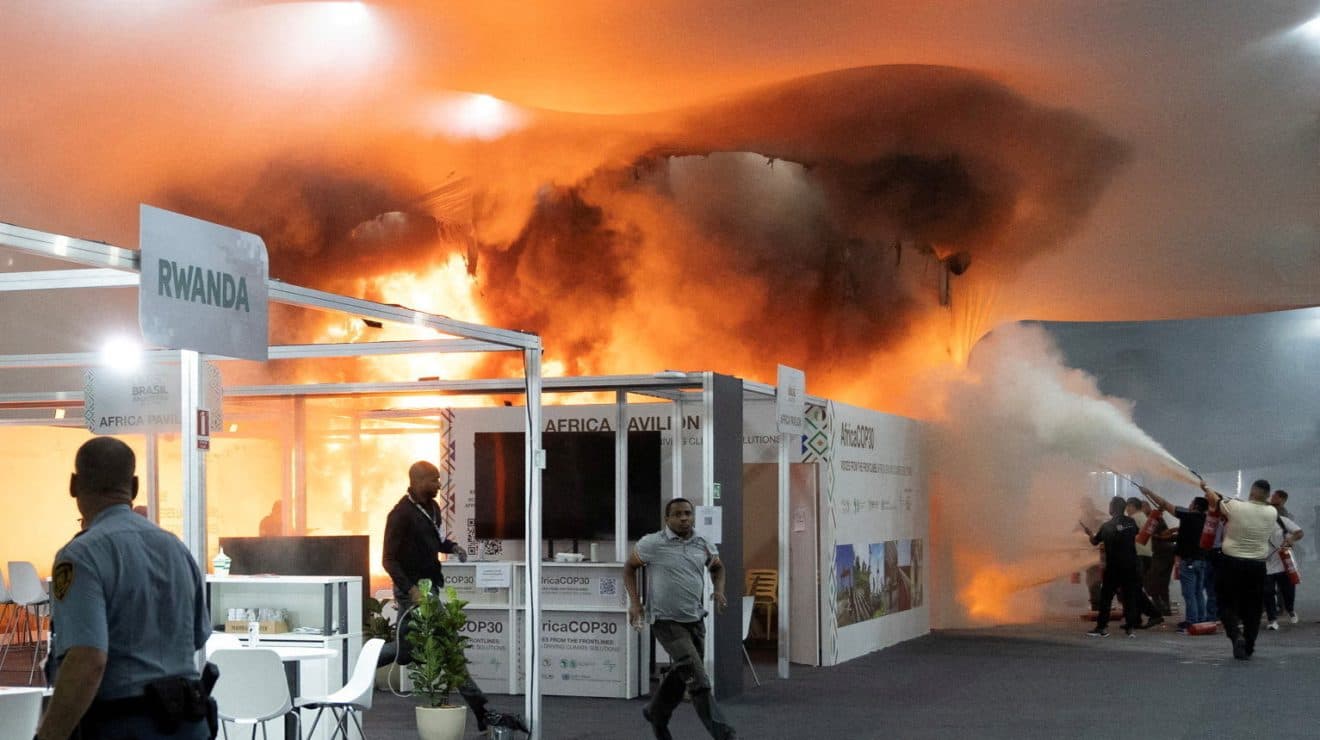We're loading the full news article for you. This includes the article content, images, author information, and related articles.
A fire at the UN climate summit in Brazil briefly halted high-stakes negotiations, pausing momentum as Kenya and African nations make a critical push for concrete financial commitments on adaptation and loss and damage.

BELÉM, BRAZIL – A fire broke out at the COP30 climate summit venue in Belém on Thursday, November 20, 2025, forcing the evacuation of delegates and temporarily disrupting critical negotiations with less than 48 hours to the scheduled close of the conference. The incident occurred as Kenya’s delegation, alongside the African Group of Negotiators, was intensifying its push for binding financial commitments from developed nations to address the escalating impacts of climate change.
The blaze started around 2:00 PM local time (8:00 PM EAT) in the “Blue Zone,” a UN-managed area restricted to official negotiators and media, causing panic and filling a central hall with smoke. A joint statement from the United Nations and COP30 organizers confirmed that the fire was contained within six minutes by emergency crews. Thirteen individuals were treated on-site for smoke inhalation, but no serious injuries were reported. Brazilian officials, including Tourism Minister Celso Sabino, downplayed the severity of the incident, suggesting a generator failure or short circuit as a possible cause, and stated it would not derail the summit. The Blue Zone was temporarily closed for a safety assessment before reopening later in the evening.
The disruption came at a pivotal moment for the talks, which are scheduled to conclude on Friday, November 21. For Kenya and other African nations, COP30 is a critical juncture to secure tangible outcomes on climate finance, a long-standing point of contention in global climate politics. The African continent, which contributes less than four percent of global greenhouse gas emissions, suffers disproportionately from climate impacts like drought and flooding.
Just a day before the fire, on Wednesday, November 19, Kenya's Cabinet Secretary for Environment, Climate Change and Forestry, Dr. Deborah Barasa, delivered a forceful address, stating that Africa is already “in the eye of the storm.” She articulated the unified African position that promises and pledges are insufficient, demanding a clear commitment of new, accessible, grant-based funding to confront a crisis the continent did not create. This follows a high-level meeting of the Kenyan delegation earlier in the week to harmonize the country's priorities, which include unlocking greater investment through the Paris Agreement to bolster national resilience.
Key demands from the African Group include operationalizing the Global Goal on Adaptation (GGA) with clear, measurable indicators and ensuring the Loss and Damage Fund, established at a previous COP, is adequately capitalized to support vulnerable nations. African negotiators are pushing back against solutions that would increase the continent's already significant debt burden.
The fire interrupted intense negotiations aimed at breaking deadlocks on the future of fossil fuels and the scale of climate finance. Developing countries have expressed deep mistrust over the failure of developed nations to meet previous financial pledges. At COP29 in Baku, a new goal of mobilizing US $300 billion per year by 2035 was agreed upon, a figure far below the US $1.3 trillion that experts and developing nations argue is necessary.
The temporary shutdown of the Blue Zone, where the core negotiations take place, paused these sensitive discussions. While the direct impact of the several-hour delay on the final outcome is yet to be determined, it added a logistical challenge to a process already fraught with political tension and running against a tight deadline. The incident underscores the logistical challenges that have shadowed the Belém conference, which has faced scrutiny over accommodation shortages and infrastructure readiness.
As the summit enters its final, decisive hours, the Kenyan delegation, which numbers 332 accredited members, will be focused on ensuring the disruption does not weaken the resolve to address the continent's core demands. The success of COP30, billed as the “implementation COP,” will be measured in Nairobi and other African capitals not by rhetoric, but by the delivery of concrete, debt-free financial mechanisms to build a resilient future.
Keep the conversation in one place—threads here stay linked to the story and in the forums.
Sign in to start a discussion
Start a conversation about this story and keep it linked here.
Other hot threads
E-sports and Gaming Community in Kenya
Active 9 months ago
The Role of Technology in Modern Agriculture (AgriTech)
Active 9 months ago
Popular Recreational Activities Across Counties
Active 9 months ago
Investing in Youth Sports Development Programs
Active 9 months ago
Key figures and persons of interest featured in this article